LOTUS LAURIE KANG
Inheritance
I recently learned that seeds inherit memories from their mother seed. This inheritance is a genetic imprint of the environment’s temperature at the time of the mother seed’s germination, so the offspring seed now remains dormant and latent until this same optimal temperature is reached. This inherited record of the environment and the eventual sprouting of the kin seed conveys embodied knowledge, while also enfolding a part of the past or mother seed, into the future, or offspring seed. This imprint is transmitted by an epigenetic mechanism – epigenetics being the study of how our genes are affected, expressed or repressed, by internal and external environments. The mechanism influences the expression of certain genes without altering their sequence; the paternal gene is silenced by biochemical methylations, while the maternal gene is expressed, encoding the seed with memories of sprouting.
Seed Woman
My paternal grandmother fled North Korea mostly on foot with her 6 children and her husband. There may have been more children, it’s been suggested that some of them were lost or died along the way. They eventually settled in Seoul where she opened up a modest shop selling grains and beans. Her husband passed early on, and she became the sole provider, mostly sleeping and living at her shop to keep mouths fed – there were now 7 of them, my father being the last born. Marketplaces in Seoul at the time were strewn with many floor bound straw-woven vessels, and bags filled with seeds, beans, rice, dried fish, fruits and numerous other foods. The last time I visited Seoul in 2018 I found the site of where her shop once was, now a luxury department store. Just adjacent to this building were a handful of older women sitting on the street, selling vegetables and foods out of plastic and straw bags and vessels. The city is still full of stark contrasts like this, with South Korea transforming from a poor nation to a hyper capitalist economy within just few a generations. I was grateful to see them there, selling their foods, selfishly to better imagine my own grandmother some time ago, but also to recognize that the past is full of stories of labour, hardship and love, and isn’t easily swept away. I wonder what will happen once this older generation fades out, but I know Koreans make powerful ghosts.
Possession
I’m curious about stretching the idea of inheritance towards an obsolete definition of it: possession. Then, pulling that further to an alternate definition of possession: to be dominated by something – a spirit, an energy, an idea – and that this state of being possessed is also an inheritance. Possession as ownership, yes, and – possession as one’s self-ownership being tenuous, shared, multiplicitous.
When my grandmother later immigrated to Toronto, her and my father became wormpickers, spending nights and dawns on golf courses and other lawns, crouched low to the ground, digging at the soil and pulling worms out from the earth and into paint cans strapped to their legs. Hers is a story of resilience and making do. It’s also the story of a gatherer, of vessels, of slimy figures, of bags full of dormant sprouts, and her body’s proximity to horizontality and the ground. It’s a story full of holes – each time I ask my parents for information some details seem to change, and my father’s memory is foggy and lacking. I didn’t know her, she died when I was a baby, but I think about her and her gathering, the holes and gaps, her labour and survival. I think about what’s seeped across membranes to me and my porous double helixes.
Keepers and Transmitters
Truth is when it is itself no longer. Diseuse, Thought-Woman, Spider-Woman, griotte, storytalker, fortune-teller, witch. If you have the patience to listen, she will take delight in relating it to you. An entire history, an entire vision of the world, a lifetime story. Mother always has a mother. And Great Mothers are recalled as the goddesses of all waters, the sources of diseases and of healing, the protectresses of women and of childbearing. To listen carefully is to preserve. But to preserve is to burn, for understanding means creating.
Trinh T. Minh-Ha, Grandma’s Story (1989)
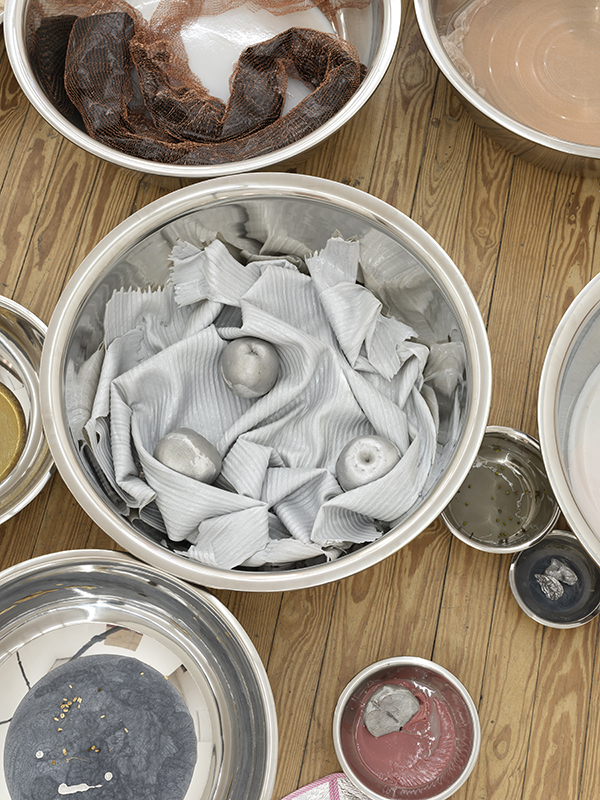
Mother (detail)
Stainless steel mixing bowls, pigmented silicone, rubber, polymer clay, power mesh, paint can, cordyceps fungus, steel machinery, peach pit, lotus seed, pewter, cast aluminum ginseng, cast aluminum cabbage, cast aluminum peach pit, cast aluminum lotus root, cast aluminum Asian pears, cast aluminum anchovies, cast aluminum clay forms, aluminum mesh, sand bag, plastic wrap, copper chainmail made by Hanna Hur, reflective foil, plastic bags, copper garden mesh, slippers, dried mung beans, dried fish bladder, dried magnolia flowers, dried hibiscus, ground mung and adzuki beans, cast bronze, hats.
2019 – 2021
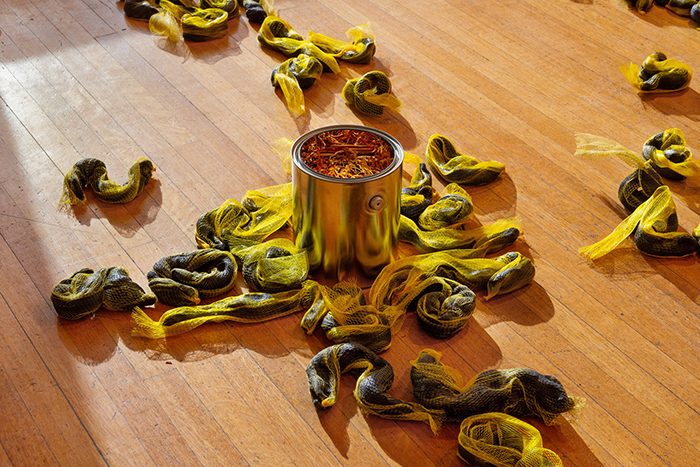
Bloom (detail)
Mesh fruit bags, polymer clay, paint cans, reflective sheeting, cordyceps fungus.
2019
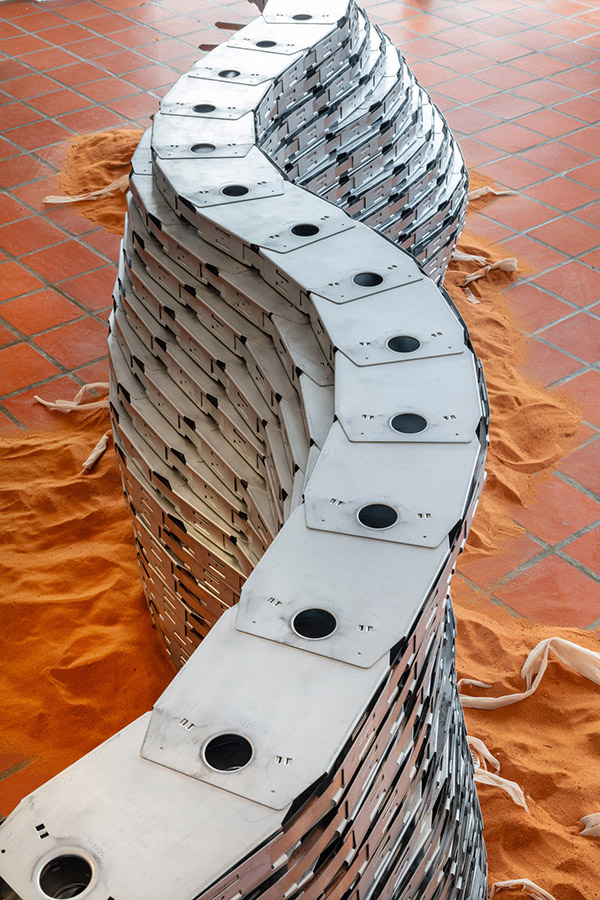
Worm (detail)
Flex-C track, sand, powermesh, cast aluminum lotus root and perilla leaf.
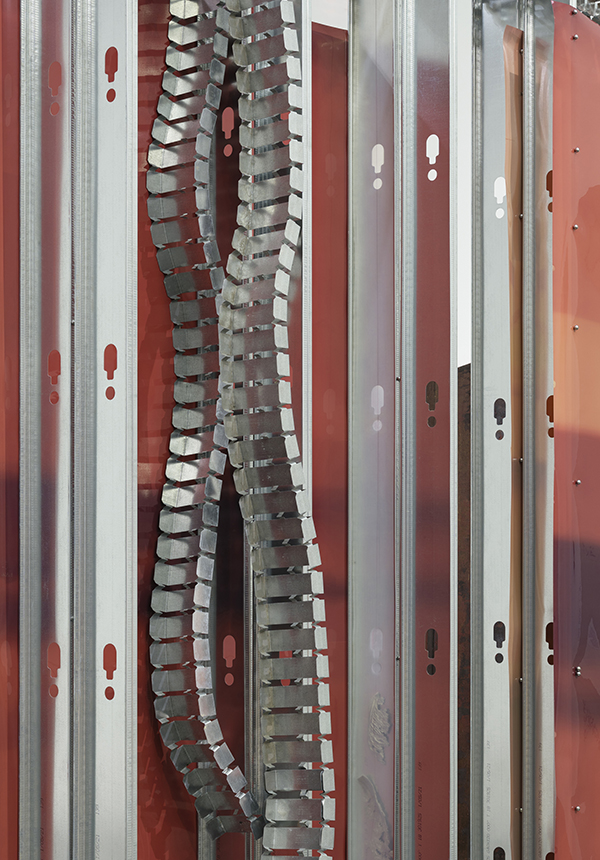
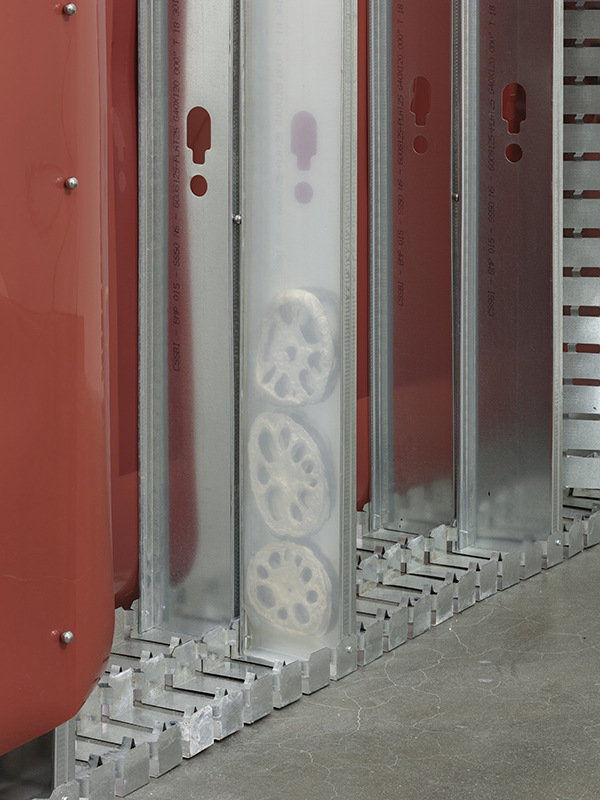
Great Shuttle (details)
Flex track, steel studs, airline cable, hardware, unfixed and continually sensitive film, photograms, spherical magnets, silicone, thread; cast aluminum anchovies, lotus root, perilla leaf, and cabbage leaf.
2020 – 2021
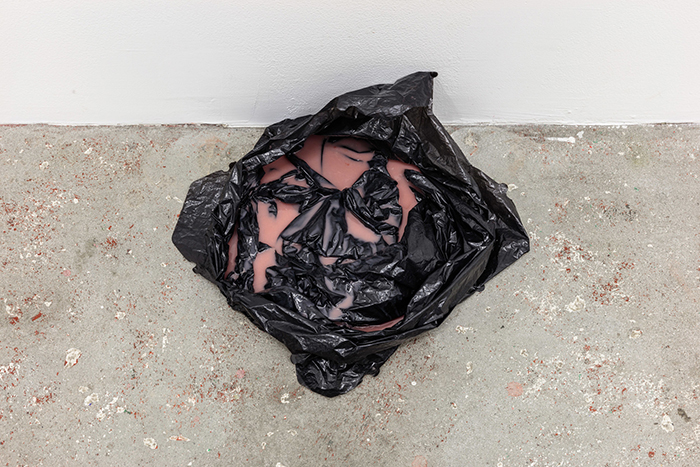
Carrier II
Plastic bag, pigmented silicone.
2019
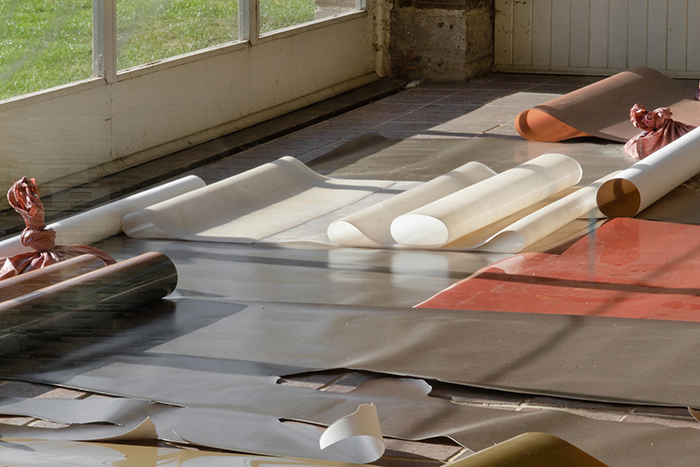
Molt (detail)
Unfixed and unprocessed photographic paper and film (continually sensitive), silicone, construction bags, sand.
2019
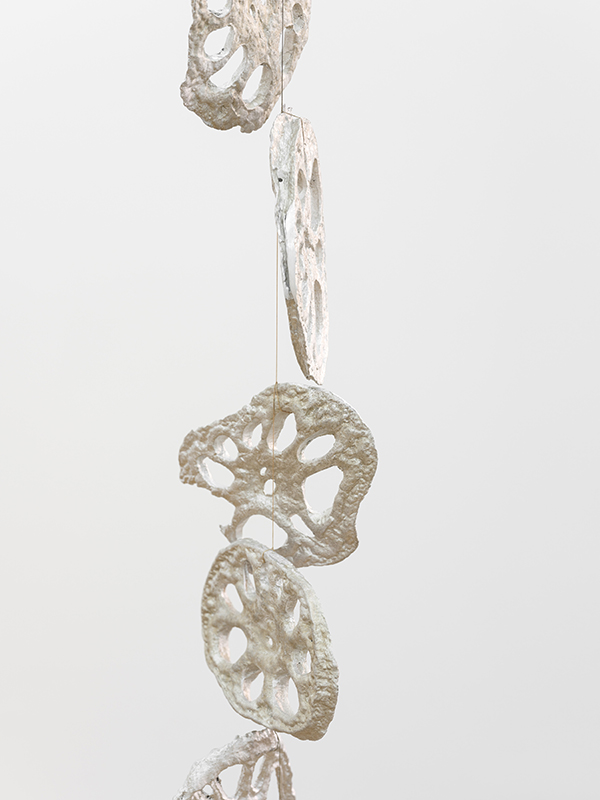
Origin Gate (detail)
Bronze, cast aluminum lotus root, thread.
2021
—
Lotus Laurie Kang was born in 1985, she lives and works in Toronto, Canada. Recent solo exhibitions of her work include EARTH SURGE, Helena Anrather, New York (2021); HER OWN DEVICES, Franz Kaka, Toronto (2020); EIDETIC TIDES, Southern Alberta Art Gallery, Lethbridge, Canada (2019); BEOLLE, Oakville Galleries, Oakville, Canada (2019); and CHANNELLER, Interstate Projects, Brooklyn (2018). Her work has been shown in group exhibitions at SculptureCenter, New York (2020); Remai Modern, Saskatoon, Canada (2019); Cue Art Foundation, New York (2019); Cooper Cole, Toronto (2017); and The Power Plant, Toronto (2015).
